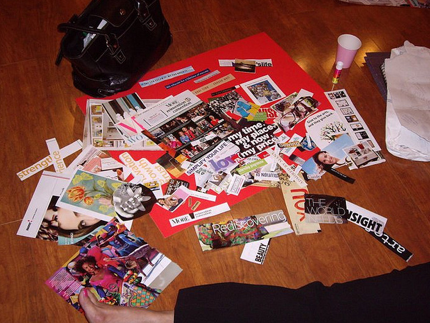Get ready to start hearing a lot about Pinterest. From the New York Times to The Wall Street Journal to XOJane it seems like more people in the mainstream press are covering and integrating Pinterest into their day to day media consumption habits than us covering the niche tech vertical.
To give you some idea of how hot this product is, know of any other invite-only beta that has over 1.5 million active users on Facebook?
Despite the whispers of Instagram-levels of user growth and elite investor interest, the tech press hasn’t yet quite caught on to the Pinterest phenomenon. Why not? Well aside from the fact that founders Ben Silbermann, Paul Sciarra and Evan Sharp are super press shy (and that women users, who are still sadly marginalized, are first on the bandwagon), the site touts itself as a “virtual pinboard” — and no one has any idea what that means.
This quirky choice of catchphrase is problematic with regards to user onboarding. Honestly when has anyone been like, “Geez, I really wish I had a virtual pinboard right about now”? But what people fail to realize is that Pinterest is actually no more a “virtual pinboard” then Twitter is a “mirco-blogging platform” or Facebook is a “social network.”
Twitter, Facebook and Pinterest, and other popular services like Instagram, Foursquare, Tumblr and Quora, are what former Pinterest designer Sahil Lavingia calls “self-expression engines.” Pinterest lets users express their creativity by providing an easy way to visually bookmark items they come across online.
Sure, highlighting that online platforms allow users to express creativity is nothing new. But I’m bringing up Lavingia’s terminology here to add context to another point; There is a common maxim among the startup community, “If you as a user are not paying for something then you’re probably the product.” What self-expression engines have in common is that their users ARE the product — their business model ultimately rests on selling advertising based around hyper-targeted user interests. Therefore, they need a robust dataset to sell ads against.
“The best way for a startup to get a dataset like that is to create some sort of self-expression platform, a way to express what you’re into …,” says Lavingia, who also designed the Turntable.fm iPhone app. “You can’t directly ask users, ‘Hey we’d love all of your data! List the songs you like and the albums you’ve bought and the places you’ve visited and the food you’ve eaten.’ But you need these answers to ultimately make money.”
Whether it be tweets, or pinboards, or photos, or albums, a self-expression engine needs to give users a way to express themselves. In return, it spills the beans on what they’re interested in to salivating advertisers. Self-expression engines essentially function as elaborate forms that let users fill in the blanks with what they like or, more pointedly and accurately, would buy more of.
So why do users voluntarily give up this precious and ultimately valuable information?
In Maslow’s hierarchy of needs, once basic needs like food, shelter, sex and friendship are met, we humans like to strive for a thing called self-actualization. “Research has shown that making a ‘vision board’ with pictures of things that inspire you to live healthier are more effective than writing goals on a piece of paper or just resolving to do them in your mind,” says an article in Shape Magazine entitled, “Can Pinterest Change Your Life?”
Exactly.
Once we’ve got a handle on the bottom rungs of Maslow’s pyramid, humans become obsessed with fulfilling our potential, hence the meticulously crafted and planned Tweet, the hours spent answering a Quora question or editing our Facebook Timelines, Lavangia’s beautiful Pinterest board full of clever food, or even the fact that I tricked my Facebook friends into thinking I was listening to 20 songs worth of Kraftwerk. This stuff becomes art.
And we become so obsessed that we fail to fully realize that our self-expression is subsequently being catalogued, repackaged, and sold to the highest bidder — if a company has reached that stage in its growth. For a chance at reaching the top of that pyramid, hell maybe it’s worth it.
Vision Board image: Wisewellwoman
